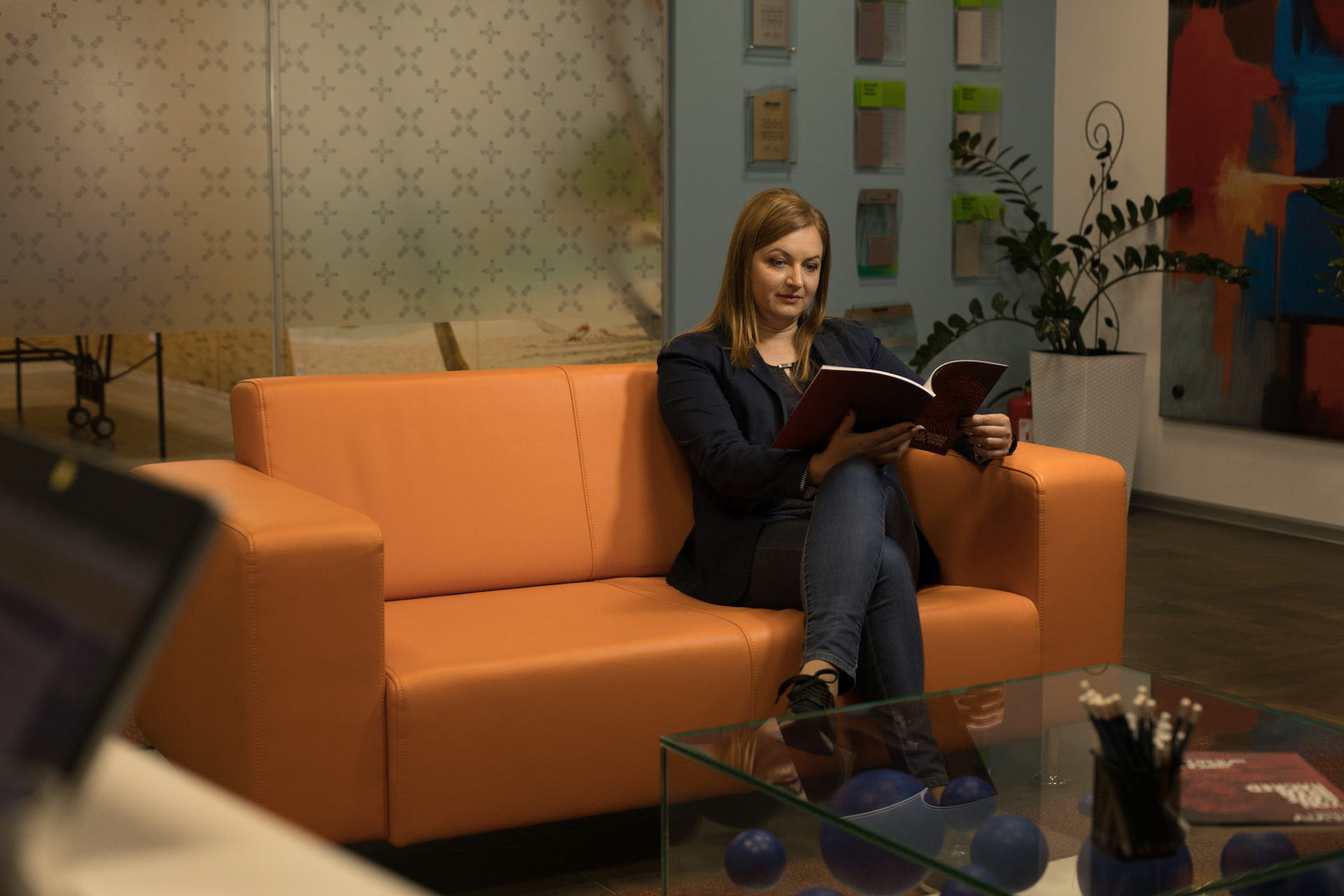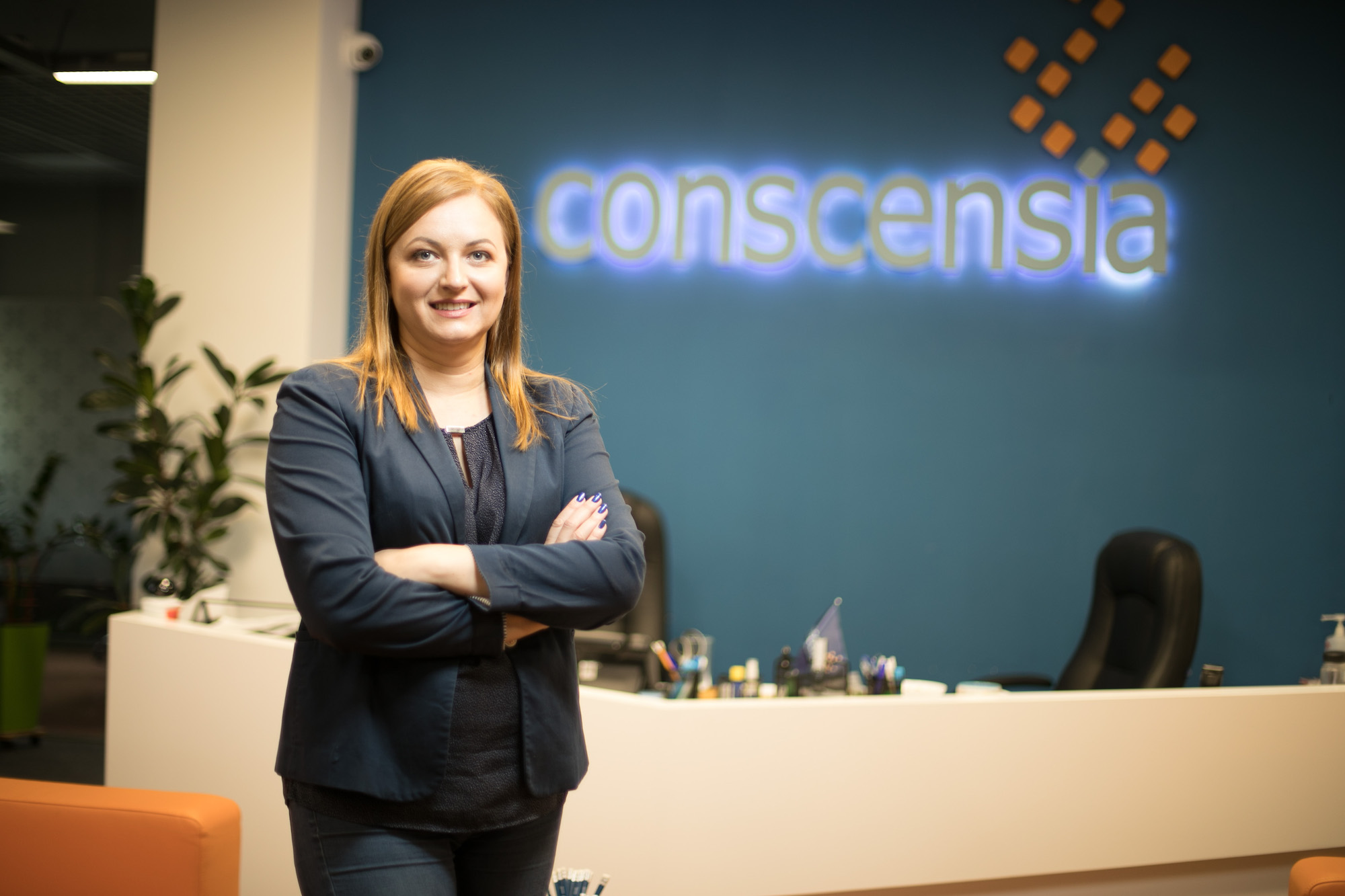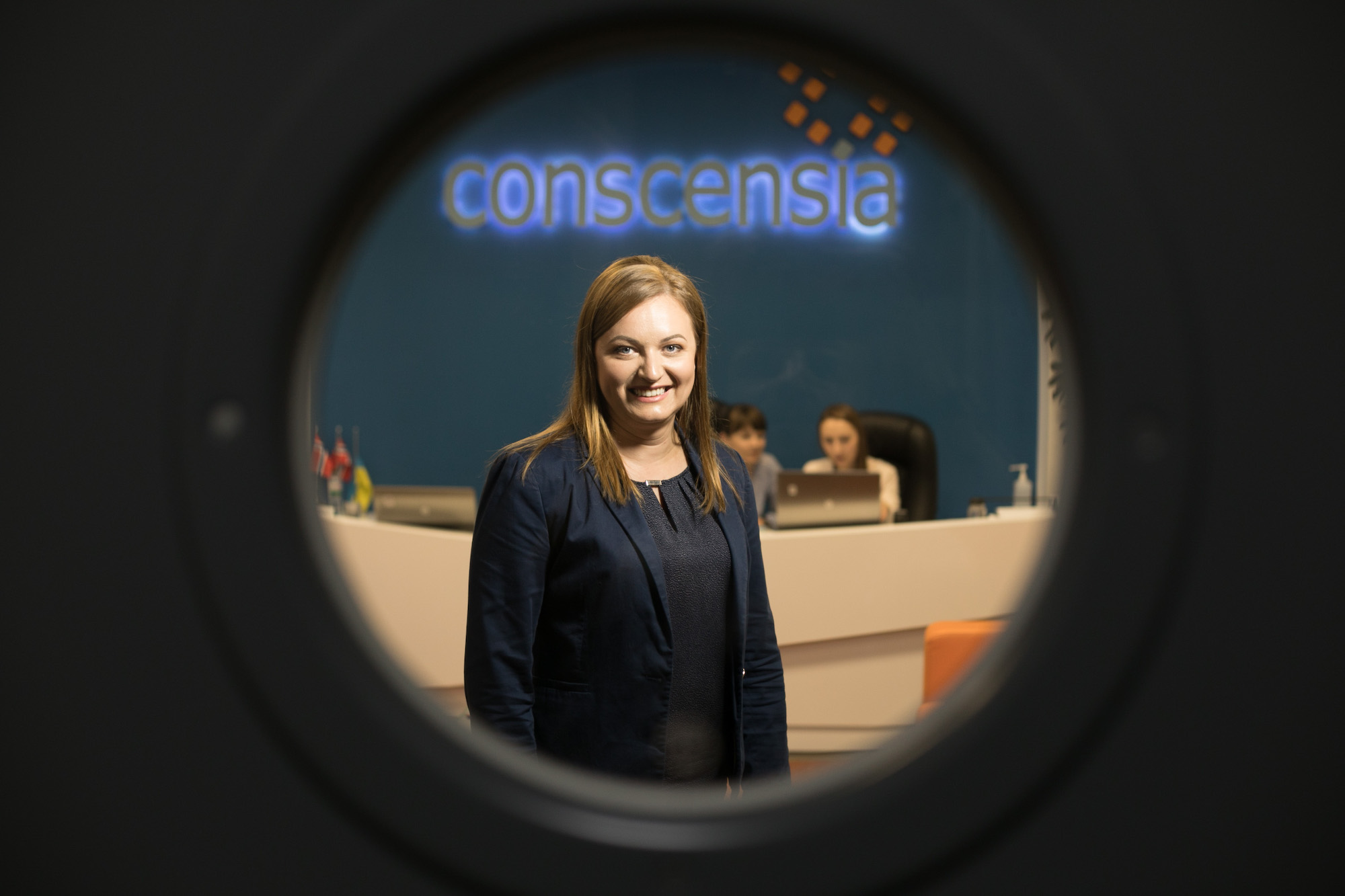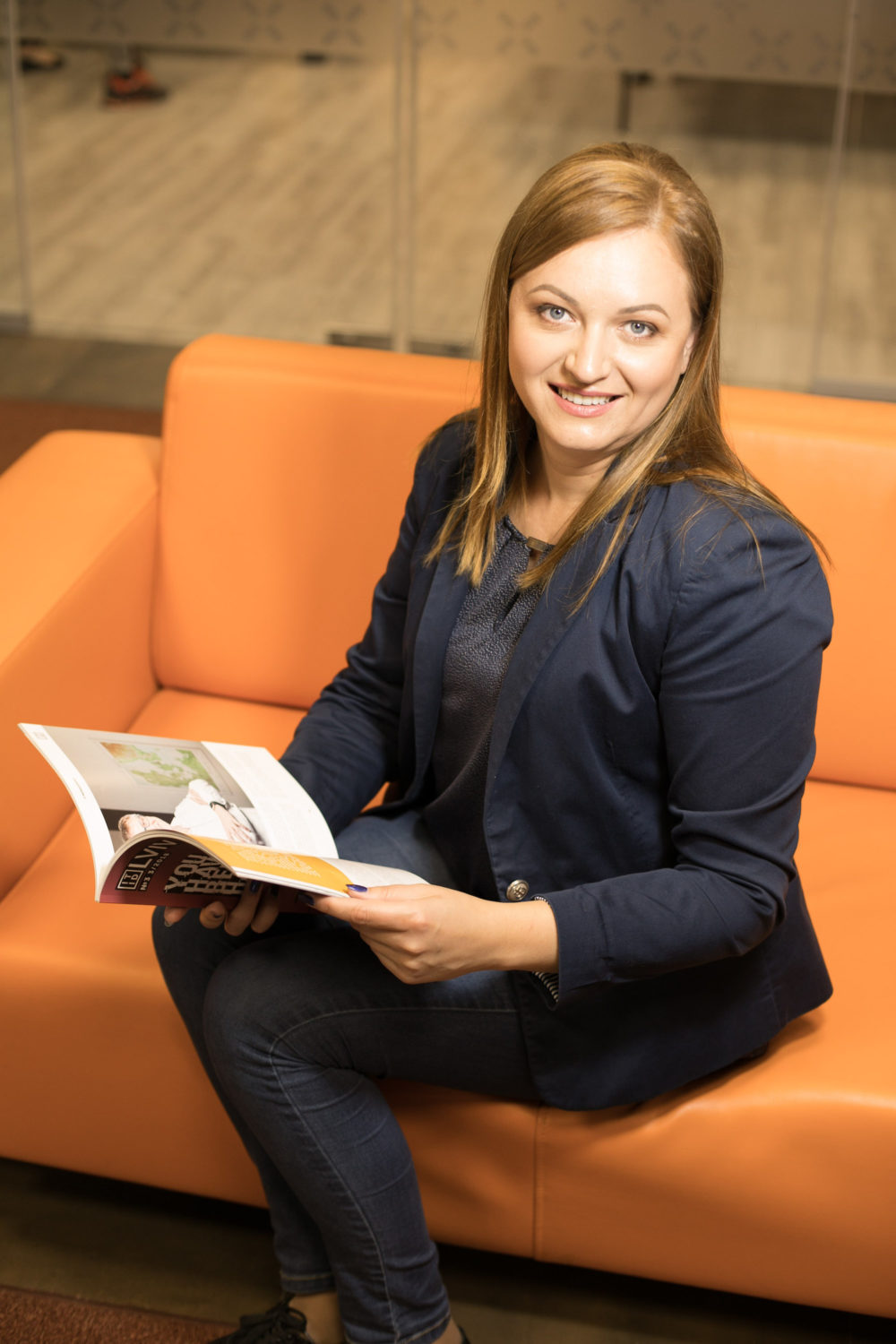“Technology of success” — a series of interviews with leaders of the most ambitious IT companies in the country. Throughout the year, together with Lviv IT Cluster, we will tell you about entrepreneurs and heads of tech companies in Ukraine, trying to better understand the people who are driving the country forward.
General Manager of Conscensia in Ukraine — about the importance of trust, the value of modesty and Scandinavian corporate culture.
Please tell us about your professional path. How did you start?
In my opinion, my professional experience is versatile and very interesting. I started working at the age of 18, right after the internship I did after college. I got my first education at Western Ukrainian College, where I studied tourism.
Later I was working as a manager in international transportation, being responsible for the international bus route “Kyiv-Brussels”. This was the start of my career. I’d been working at the company for about five years and had later been transferred from international transportation to finance department.
Finance turned out to be my “trademark”. It’s my vocation, an area I feel confident in. Unlike most people, I love reports. (Smiles)
In 2005 I was lucky to meet representatives of one Danish company. It was a newly established metallurgic enterprise with Danish investments. We started to develop together. I was the company’s first employee: started as an accountant and in two years was able to lead the company.
I turned 25 at that time. I learned a lot about the specifics of working with the Danes: how they treat their employees, work, company, and how they communicate with clients. It’s my personal pride and the first company I spent eight years in and got my main experience. During the period when I was managing the company, its profitability reached 300%.
A “transfer period” with another Danish company followed. It was a sewing factory located in Lviv. I was managing a few departments there. But soon Conscensia found me. Given that I spent a lot of time in the local Danish community and knew many people, I met representatives of the company in 2014. I have been working with the Danes for over 13 years and this is the third Danish company I work with.
What were the key challenges when changing industries?
I knew about the IT industry for a while, but I wasn’t particularly interested. Getting there wasn’t my goal. I liked my job at the time — I was enjoying the production process. The industry itself isn’t important — I just like the idea of making a real product: something I can see and touch, when a real project emerges from something previously raw. I like the idea of being able to influence the effectiveness of work and process optimization.
My role in IT is a bit of a different story. The main focus is not on technology or ready-made products, but on people. It was a challenge for me. I wasn’t used to be more than a leader who gives instructions. My work at Conscensia, above all, revolves around properly organizing communication and integration. You have to develop constantly and stay in trend. In the last two years, I have progressed in this field. I continue to work on my soft skills and don’t plan to stop.
How difficult was it to adapt to new conditions?
People I know sometimes joke that I collect diplomas and will study forever. (Smiles) I have degrees in economics and law and am currently studying psychology.
It wasn’t difficult for me to “switch” between industries. Of course, you need to understand the profile of the company and the specifics of work, but when you have basic knowledge and understand the principles of business, studying a new field is not a problem.
As I’ve already mentioned, the only challenge was in learning new communication skills.
What’s the story behind Conscensia?
Conscensia was established in 2006. It’s a sister company of a Danish company called Celenia that was actively cooperating with developers from Kyiv at the time. The founding company had a niche specialization, in particular, competence in Microsoft Dynamics and other areas of software development.
Later Celenia had decided to expand the scope of technology it worked with. Since Celenia had a clear direction, its newly established subsidiary would expand the range of technologies.
You have to look for satisfaction in small things, feel “here and now” and be grateful

That’s how Conscensia emerged. In the beginning, it was working with professionals located in Lviv, then expanded to Kyiv. Our first client was from the banking industry, that’s when our original team got together. Developers from this team have recently celebrated their tenth anniversary with Conscensia.
We focus on the European market — the majority of our clients are from Denmark, Norway, and Germany. We support the European style of work and stick to Scandinavian corporate culture, which we inherited from the Danes.
What do you mean by “stick to Scandinavian corporate culture”?
Scandinavian corporate culture takes its origins from ancient history. At a time when Scandinavian peoples united into small groups in order to work together and survive, all decisions were made collectively and the opinion of each individual was equally important. It has survived until now. According to Scandinavian principles of work, everyone has the right to have an opinion and it is equally important, whether it is a CEO or an engineer. Everyone takes part in the decision-making process and can express their opinion as openly as possible.
The feeling of “hygge” is also very important for the Danes. And it has to do not just with being at home, but at work too. I see it as coziness without anxiety. In short, you have to look for satisfaction in small things, feel “here and now” and be grateful.
It’s about coziness and internal comfort. In Ukraine, you have to win trust, whilst the Danes have unconditional trust to colleagues, government and friends. We even had a series of training sessions on trust by a professor from Denmark. People spend a lot of time and effort researching these things.
What makes Conscensia different from other companies?
Conscensia is a social company, what distinguishes us are our values and principles of work that we have inherited from the Danes and our Scandinavian clients.
The company’s three key values are trust, transparency, and responsibility. In our company, management doesn’t try to stand out or distance itself. When our CEO Karsten Hansen visits Lviv, he works in an open space, not a private room.
We strongly encourage people to join the dialogue, invite them to discuss and brainstorm new ideas about changes in the company and its development. It is important for us that people remain faithful to themselves, express their thoughts, and don’t lose themselves.
This is how it’s done in Scandinavian countries. Everyone can come and propose an idea or a project. Certainly, not every idea can be implemented, but it has the right to be heard.
Another feature of Danish culture that we have adopted is the belief that people who have a healthy balance between work and personal life are much more effective and happier at work. Because of this, we strongly encourage people to have free time. A flexible schedule encourages it — a great tradition is our short Fridays — after 15:00 everyone can start the weekend.

Why ambitious young people should choose your company?
First of all, because of our differences I just spoke about. Secondly, our teams are completely integrated with a client’s teams. Such a model allows developers to be in touch directly with the client on a daily basis. This promotes the development of communication skills and helps to practice English.
Being involved is important for many people. A developer can make changes and offer ideas on any stage of a project. Clients often visit us in Lviv, so employees communicate with them not only via Skype but in person too. Also, we often go on business trips visiting countries where our clients are based.
Every company has its big idea. What’s the big idea of Conscensia? And what’s your big idea?
I will start with myself, a few global things. I’d like to somehow influence the Ukrainian mentality. Every day, with my own example, I try to show friends, colleagues, neighbors that it is not necessary to complain about the state, power, and people. On the contrary, one can take initiative in their hands, act, help, change themselves and the country for the better. I’m optimistic this way. It’s my big idea for life. (Smiles)
As for Conscensia, every day the company strives to be a professional, responsible and long-term partner for both its clients and employees, focusing on the people and ethics.
I think that the Danes are very humble people, they don’t try to stand out, they just modestly do their work at a decent level. Similarly, Conscensia, as a company, isn’t trying to change the world, but provide decent work, create software that will help people every day.
What about specific projects of the company and successful tech solutions that you managed to implement?
We are proud of every client and project we have or did. All of them help to solve important problems or tasks for hundreds of thousands of people. We have many interesting projects in various fields, including healthcare, banking, education, oil extraction industries, and even in maritime navigation.
In addition, there is one R&D project in which our developers actively collaborate with Danish scientists in the field of optics, working on an innovative thermal hyperspectral camera. Unfortunately, I cannot disclose details of the project. However, I can confidently say that there are no analogs of such product in the world.
We are constantly evolving and in the future, we don’t plan to slow down. By the way, in 2019 Conscensia opens a development center in Warsaw in order to be able to carry out projects that can only be developed in the EU. Of course, we will also continue to work with more Ukrainian developers.

How difficult is it to work with international partners and get along with them?
The mentality of Ukrainian and Danish people is really quite similar. There are, of course, certain peculiarities which, above all, are caused by historical factors.
Denmark has a long history of being independent, while Ukraine was and remains to be a sphere of interest for other countries. It continues to fight for its independence. The USSR also played a big role in this. In general, it’s easy to communicate with the Danes, they are open and friendly. It’s not a coincidence that many different Danish companies started working in the Lviv region at the beginning of the 2000s.
Moreover, there’s a very big Danish community in Lviv. I’m a member of “Danish company directors club”. Lviv and Lviv region were chosen because of their relatively close proximity to Denmark. The similarity of our mentalities also plays a significant role.
By the way, for everyone joining our team we offer training on culture intelligence, where the main focus is put on cultural differences and their understanding.
There are not many women among company leaders in the IT industry. How do you manage?
Nothing is accidental. And it’s the case with the Danish company because they have fairly noticeable gender parity. When working with the Danes, there is no difference in who negotiates — a man or a woman.
In fact, it’s not difficult to become a leader, but it’s also not easy to work if you take into account the Ukrainian context. That was the case at my previous jobs, in particular, in the field of metalworking. Now I work in the technology industry, where the majority is formed by men. In addition, I am a member of Lviv IT Cluster Supervisory Board. I am the only woman among board members. I have to adapt because I have a bit more, let’s say, sentimental vision about the world than men do.
It is necessary to adapt to the fact that men make decisions quickly, pragmatically, usually without going into details. I, on the other hand, have a tendency toward sentiments in certain moments and I sometimes I have to tame them.
Moreover, I am a mother of three children. Holding management positions, I never had the opportunity to have real maternity leave and tried to spend all my spare time with the family. There is nothing more important than daily and strategic planning. (Smiles) I also try to teach children to take responsibility for everything they do.

What would you recommend to young professionals who are just starting their way in the IT industry?
First of all, believe in yourself and your capabilities. If you have a great idea, then you already have enough strength to implement it. Visualize things that seem impossible on the first hand!
Secondly, learn, keep learning and polishing your skills, be it hard or soft skills. The world doesn’t stand in one place. New skills help you to stay in trend and get where you want to be.
Have your own opinion, but don’t forget to hear others
Thirdly, always have your own opinion, but don’t forget to hear others. It’s something I learned from the Danes. They balance it well — they express their opinions directly, but sincerely listen to others.
Last but not least, finish what you started. There’s a good saying: «Ideas are worthless, execution is everything». It doesn’t matter how many cool projects you started or had an idea of, what’s important — the projects you managed to realize and show to the world.


